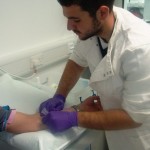Hearing preservation and optimisation
USAIS staff are contributing to, or leading, research into preservation of residual hearing after cochlear implantation; improved detection and prevention of adverse events including device failures and optimisation of tuning. The lead staff member in this area is Dr Carl Verschuur who works in collaboration with Dr Tracey Newman and the Clinical Neuroscience Group to understand how factors such as inflammation may lead to loss of residual hearing, and also different types of measures can predict adverse events. We work closely with Southampton Neuroscience Group.
Current Doctoral Student Projects
Akosua Ageymang-Prempeh, Inflammaging and age-related hearing loss. Supervised by Dr Carl Verschuur and Dr Tracey Newman
Akosua’s PhD work focuses on the contribution of chronic inflammation on age-related hearing loss, to try to find ways in which hearing loss with age could be slowed down.
Associated publication:
Alan Sanderson, Prevention and prediction of cochlear implant adverse events. Supervised by Dr Carl Verschuur and Dr Tracey Newman
Alan’s PhD work focuses on the development of new ways to understand how inflammation in the inner ear affects cochlear implant outcomes, particularly adverse events and preservation of hearing after implantation, focusing in particularly on the use of “impedance telemetry” for this purpose.
Recent Doctoral Student Projects
 Mary Grasmeder, Optimising frequency-to-electrode allocation for individual cochlear implant users. Supervised by Dr Carl Verschuur
Mary Grasmeder, Optimising frequency-to-electrode allocation for individual cochlear implant users. Supervised by Dr Carl Verschuur
Mary has recently completed her PhD which looked at ways of improving cochlear implant users’ aided hearing by customizing the frequency characteristics of the device.
Associated publications:
Optimizing frequency-to-electrode allocation for individual cochlear implant users.
Perception of the pitch and naturalness of popular music by cochlear implant users.
 Andrew Causon, Inflammatory status as a predictor of hearing loss. Supervised by Dr Carl Verschuur.
Andrew Causon, Inflammatory status as a predictor of hearing loss. Supervised by Dr Carl Verschuur.
Andrew’s work focused on the link between inflammation and preservation of hearing after cochlear implantation, and the role biological processes might play in cochlear implant adverse events.
Associated publications:
The role of the immune system in hearing preservation after cochlear implantation.
Other relevant recent publications:
The role of first formant information in simulated electro-acoustic hearing.

